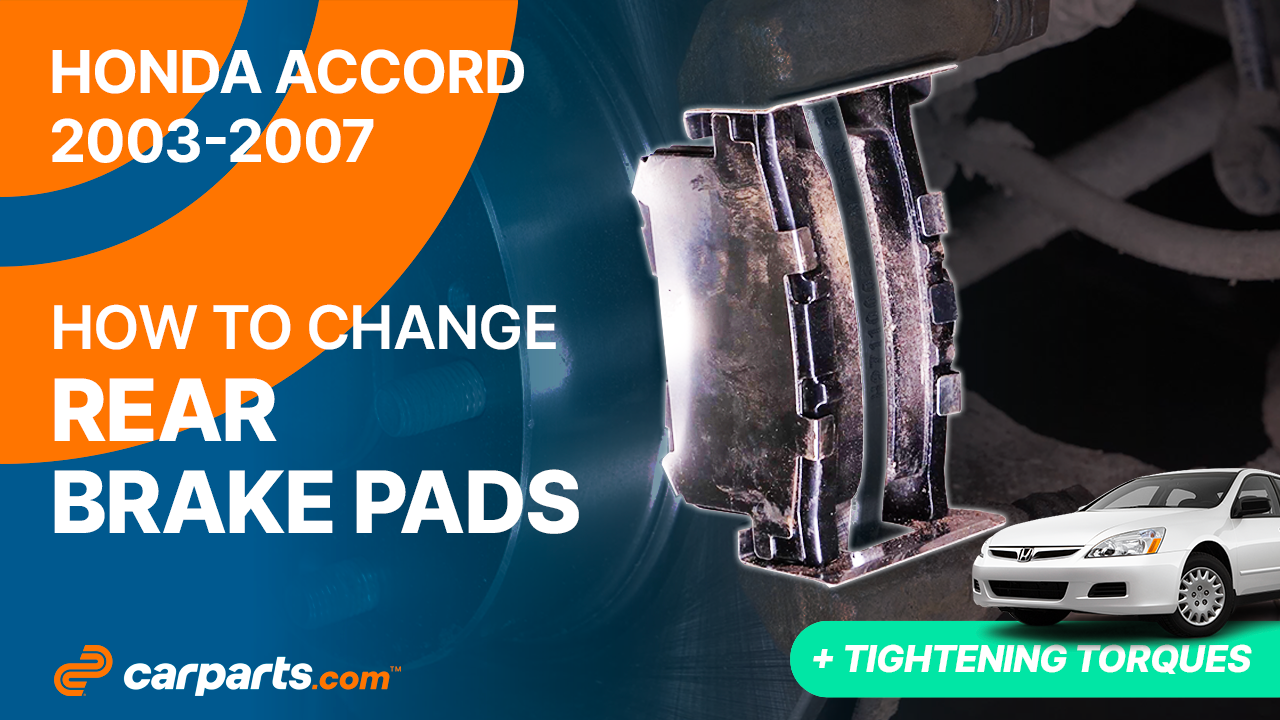
How to replace the rear brake pads 2003-2007 Honda Accord
To replace the rear brake pads on your Accord this tutorial was tailor-made for you. You will need to open the brake fluid reservoir, lift the vehicle, loosen the parking brake as well as carry out a few other steps. You can carry out this tutorial of 16 chapters in 45 minutes. Take your 12 mm wrench and your 17 mm wrench and let’s get started!
Duration
45 minutes
Number of steps
16
Difficulty out of 5
2
Average savings
$50
Parts You Will Need
Tools You Will Need
Step-by-Step Installation
Chapter 1:
Open the brake fluid reservoir
Step 1/2
Turn off your vehicle’s ignition, set the parking brake, pull the hood release handle and open the hood.

Chapter 1:
Step 2/2
Open the brake fluid reservoir.

Chapter 2:
Lift the vehicle
Step 1/3
Loosen the wheel lug nuts on the rear wheels.

Chapter 2:
Step 2/3
Lift the rear of your vehicle. Place the vehicle on the jack stands.



Chapter 2:
Step 3/3
Don’t forget to put the wheels under the vehicle!

Chapter 3:
Loosen the parking brake
Step 1/1
Before you start, release the parking brake otherwise the operation will be impossible.

Chapter 4:
Remove the brake caliper
Step 1/3
With a 12mm wrench, unscrew the slide pins.


Chapter 4:
Step 2/3
You can use a 17mm wrench to prevent the bolts from rotating. Then, remove them.

Chapter 4:
Step 3/3
You can now remove the caliper. Place it on the rear control arm so as not to pull on the brake hose


Chapter 5:
Remove the brake pads
Step 1/2
Remove the brake pads.


Chapter 5:
Step 2/2
Using a flat head screwdriver, remove the anti-rattle clips.

Chapter 6:
Clean the brake caliper mount
Step 1/1
Brush the caliper mount around the pads to remove any extra rust that could prevent the pads from sliding.

Chapter 7:
Install the new anti-rattle clips
Step 1/2
Get hold of the anti-rattle clips supplied in the kit.

Chapter 7:
Step 2/2
Place the new anti-rattle clips on the caliper mount.


Chapter 8:
Place the new brake pads
Step 1/2
Grab the new pads, and lightly coat the ends with copper grease to help them slide more easily.


Chapter 8:
Step 2/2
Insert the new pads into the caliper mount by sliding them in.


Chapter 9:
Retract the piston
Step 1/2
Press the piston into the brake caliper. For this step, it is essential to have a brake calliper windback tool, which is a specific tool that allows you to press the piston into the caliper but also to make it turn on itself to reset the slack adjuster of your handbrake.


Chapter 9:
Step 2/2
This step is essential before installing the new pads. As the piston enters the brake caliper, brake fluid will flow back into the brake fluid reservoir. Depending on the original level of the reservoir, make sure that the liquid does not overflow.
Chapter 10:
Install the new pad retaining clip
Step 1/3
Using a flat head screwdriver, remove the pad retaining clip.

Chapter 10:
Step 2/3
Take the new clip provided in the kit.

Chapter 10:
Step 3/3
Position the clip in the caliper by prying it with a screwdriver.


Chapter 11:
Tips
Step 1/2
You need to check the sliding of the brake caliper slide pins and the condition of the Caliper slide pin boots.



Chapter 11:
Step 2/2
If they look worn, you are advised to replace them with new ones.
Chapter 12:
Put the brake caliper back
Step 1/4
Put the brake caliper back in place and screw in the slide pins, by hand at first.



Chapter 12:
Step 2/4
Screw them in using 12mm wrench.


Chapter 12:
Step 3/4
You can use a 17mm wrench to prevent the bolts from rotating.
Chapter 12:
Step 4/4
Finish tightening using a torque wrench.

Chapter 13:
Clean
Step 1/1
Clean the disc with brake cleaner and a cloth to remove the grease from the new pads.


Chapter 14:
Passenger side
Step 1/1
You can now repeat the same process on the other side.
Chapter 15:
Put the vehicle back on the ground
Step 1/3
Then, you will be able to put the wheels back on your vehicle.


Chapter 15:
Step 2/3
Put the car back on the ground and block the wheels properly.


Chapter 15:
Step 3/3
Don’t forget to screw the brake fluid cap back on before starting the car.

Chapter 16:
Safety tips
Step 1/3
Attention! Before using your vehicle again, start your car, and pump the brake pedal a few times to push the brake pads together again.



Chapter 16:
Step 2/3
Try to drive smoothly and avoid sudden braking for the first 30 miles or so, to avoid glazing the new pads.
Chapter 16:
Step 3/3
Operation complete.